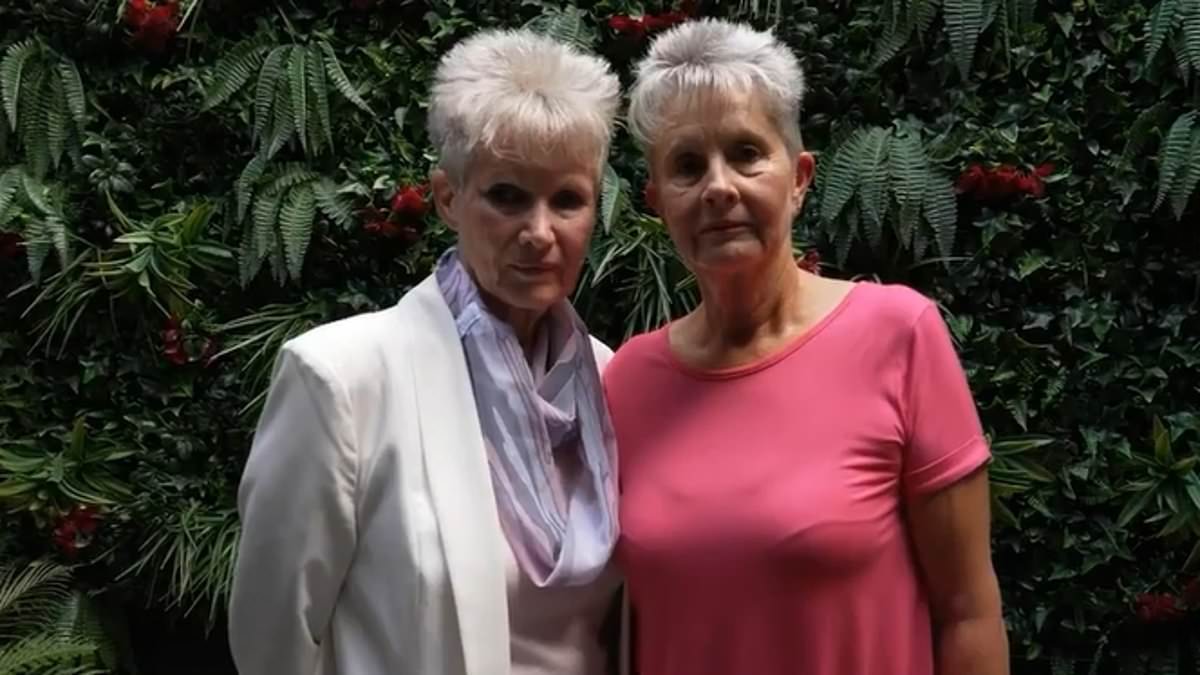An Aussie couple have lost almost $250,000 in a scam so sophisticated that it even went undetected by professional bank tellers.
Sunshine Coast couple Kerry O’Mahony and Kerry Littlejohn had been shopping around for the best interest rate on their term deposit.
Thinking they’d found the best offer through ING , the pair clicked a link to what they assumed was their website.
‘I clicked on obtain a quote and within, I think, about a day or two of doing that we had a phone call… from ING,’ Ms O’Mahony told A Current Affair.
A person impersonating an ING employee emailed through a fake quote, documents, contracts and payment instructions using the bank’s logos.
The couple went into their local Suncorp Bank branch and withdrew their money.
‘He looked at [the emails] and then he said yeah, it looks alright but you know if you’re really concerned you can ring ING,’ Ms O’Mahony said.
Ms O’Mahony claimed to have called ING in front of the teller.
She said she Google searched the ING number and called 13 34 64, but got through directly to the scammers instead of the bank.
Ms O’Mahony was unaware her phone had been spoofed by the scammers, meaning they had the ability to redirect her calls to pose as ING.
She said the Suncorp teller approved the transaction and $240,000 was transferred directly to the scammers.
It is understood that there were some tell-tale signs from the scammers that went undetected.
It is believed the account details for what they thought was an ING account was actually for a Commonwealth Bank account and the email address being used by the scammers wasn’t an authorised ING email.
Ms O’Mahony said the funds were taken out and then moved around the world through various IP addresses by the time they contacted the Commonwealth Bank about the scam.
While the pair hold the scammers accountable for the ordeal, they believe Suncorp are also partly to blame.
‘I just felt that [Suncorp’s] duty of care to us was sadly lacking,’ Ms O’Mahony said.
The couple have lodged a complaint with the n Financial Complaints Authority.
Suncorp said in a statement the case is currently being reviewed and that they’re fully participating in that process.
‘Suncorp Bank understands the impact frauds and scams can have on individuals,’ it read.
‘Alongside the banking industry, we are committed to implementing the measures outlined in the Scam-Safe Accord including account name checking for domestic payments.’
Daily Mail contacted Suncorp Bank for further comment.
Always stop, think and check before you act.
Scammers rely on you not spotting these warning signs because you’re in a hurry, you don’t want to miss something that looks like a great deal, or because it seems like it’s from someone you trust.
It can be very hard to spot a scam, but there are some red flags to look out for:
– Scammers trick you into believing you’re getting an incredible deal or offer. They pressure you to act quickly so you don’t miss out
– Scammers try to use your good nature against you. They tell heartbreaking or tragic stories to convince you to help them and give them money.
– Never automatically click a link or attachment you receive via email or text. Scammers try to catch you off guard and send you to scam websites designed to steal your information and money.
– Scammers don’t want you to take your time to think things through. They use techniques designed to catch you off guard and rush you, either saying if you don’t you’ll miss out or threatening that something bad will happen.
– If a person asks you to pay with preloaded debit cards, iTunes cards, or virtual currency like Bitcoin, chances are it’s a scam. Once this money is spent, you can’t get it back.
– If someone asks you to set up a new bank account or PayID in order to pay them (or be paid by them), this is a clear sign you should be suspicious. It could be a scam, or money laundering. Your bank will never ask you to open new accounts to keep your money safe.
Tips to protect yourself from these scams:
– STOP: Don’t give money or personal information to anyone if unsure. Scammers will offer to help you or ask you to verify who you are.
– THINK: Ask yourself if the message or call could be fake. Never click a link in a message. If you are unsure, say ‘no’, hang up or delete.
– PROTECT: Act quickly if something feels wrong. Contact your bank immediately if you notice some unusual activity.
Information from www.scamwatch.gov.au
